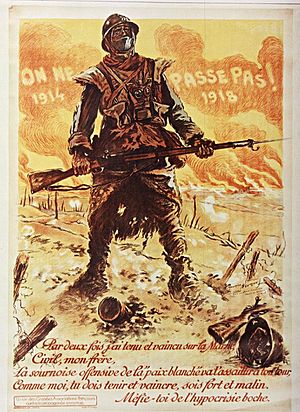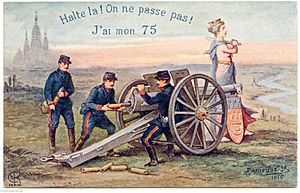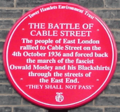They shall not pass facts for kids
The phrase "They shall not pass" (which is "French: Ils ne passeront pas" in French) is a famous saying. It shows a strong decision to defend a position against an enemy. This slogan was first used by France in World War I. It was also used during the Spanish Civil War by the Republican side.
How the Slogan Started
The widespread use of this slogan began in 1916. This was during the Battle of Verdun in the First World War. French General Robert Nivelle told his troops not to let the enemy get through. The simpler slogan "they shall not pass" then appeared on French war posters. A very famous one was made by French artist Maurice Neumont. This poster came out in the last year of the war. It was after the Allied victory at the Second Battle of the Marne.
Later in the First World War, Romanian soldiers also used the slogan. This was during the Battle of Mărășești. The Romanian version of the phrase is "Pe aici nu se trece". This means "One does not pass through here".
French army units used the slogan on their uniform badges. These units were stationed at the Maginot Line.
When Else Was It Used?
French politician Léon Blum used this phrase in 1934. He said "Ils ne passeront pas !" against a large protest. The word "Ils" (meaning "they") referred to the fascist protesters.
The slogan was also used during the Spanish Civil War. This happened at the siege of Madrid. Dolores Ibárruri Gómez, a member of the Communist Party of Spain, said "No pasarán" in a famous speech. This was on July 18, 1936. The leader of the Nationalist forces, Generalísimo Francisco Franco, later took Madrid. He replied to the slogan by saying "Hemos pasado" ("We have passed").
British anti-fascists used "¡No pasarán!" in October 1936. This was during the Battle of Cable Street. The phrase is still used today in some political groups. It was often said with the words nosotros pasaremos. This means "we will pass". It showed that communists, not fascists, would gain state power.
The phrase became well-known again in December 1943. This was because of French-Canadian officer Paul Triquet. He was part of the Royal 22e Regiment. He used Nivelle's phrase to win an important goal at Ortona, Italy. He faced very strong German opposition there.
In the 1980s, the phrase ¡No pasarán! was a key idea. It was used in the civil wars in Central America. This was especially true in Nicaragua. "Nicaragua no pasarán" is also the name of a 1984 film. It was made by David Bradbury. The film is about the events in Nicaragua that led to the end of Somoza's dictatorship.
Images for kids
-
On ne passe pas!, French medal for the Battle of Verdun
See also
 In Spanish: No pasarán para niños
In Spanish: No pasarán para niños
- Awake iron!
- Molon labe
- Order No. 227 (Stalin's "Not one step back" order)
- Venceremos
- Raised fist
- List of last stands
 | James B. Knighten |
 | Azellia White |
 | Willa Brown |






